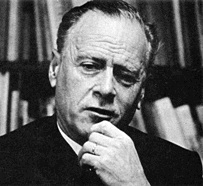Difference between revisions of "Marshall McLuhan"
Caseorganic (Talk | contribs) |
Caseorganic (Talk | contribs) |
||
| Line 53: | Line 53: | ||
====From Cliché to Archetype (1970)==== | ====From Cliché to Archetype (1970)==== | ||
| − | + | ===Related Reading=== | |
| + | *[[Understanding Media]] | ||
| + | |||
| + | ===External Links=== | ||
| + | http://www1.marshallmcluhanspeaks.com/?video=0 | ||
[[Category:People]] | [[Category:People]] | ||
__NOTOC__ | __NOTOC__ | ||
Revision as of 17:58, 1 February 2011
Quotes
"In the electric age we wear all of mankind as our skin." Marshall McLuhan
"The automobile is an extension of your feet, clothing an extension of your skin, glasses an extension of your eyes, the internet an extension of your nervous system". ~Marshall McLuhan
"The computer is the most extraordinary of man's technological clothing; it is an extension of our central nervous system. Beside it the wheel is a mere hula-hoop". Marshall McLuhan, War and Peace in the Global VIllage (quoted in [[Cyborg: Digital Destiny And Human Possibility In The Age Of The Wearable Computer |Cyborg]] by Steve Mann, 1).
We become what we behold. We shape our tools and then our tools shape us. Marshall McLuhan
Publication is a self-invasion of privacy. Marshall McLuhan
Our Age of Anxiety is, in great part, the result of trying to do today's job with yesterday's tools and yesterday's concepts. Marshall McLuhan
In this electronic age we see ourselves being translated more and more into the form of information, moving toward the technological extension of consciousness. Marshall McLuhan
For tribal man space was the uncontrollable mystery. For technological man it is time that occupies the same role. Marshall McLuhan
As the unity of the modern world becomes increasingly a technological rather than a social affair, the techniques of the arts provide the most valuable means of insight into the real direction of our own collective purposes. Marshall McLuhan
As technology advances, it reverses the characteristics of every situation again and again. The age of automation is going to be the age of 'do it yourself.' Marshall McLuhan
Art at its most significant is a Distant Early Warning System that can always be relied on to tell the old culture what is beginning to happen to it. Marshall McLuhan
A commercial society whose members are essentially ascetic and indifferent in social ritual has to be provided with blueprints and specifications for evoking the right tone for every occasion. Marshall McLuhan
The spoken word was the first technology by which man was able to let go of his environment in order to grasp it in a new way. Marshall McLuhan
History
“Marshall McLuhan, CC (July 21, 1911 – December 31, 1980) was a Canadian educator, philosopher, and scholar—a professor of English literature, a literary critic, a rhetorician, and a communication theorist. McLuhan's work is viewed as one of the cornerstones of the study of media theory, as well as having practical applications in the advertising and television industries” [1]
Understanding Media (1964)
"Hot" and "cool" media “In the first part of Understanding Media, McLuhan also stated that different media invite different degrees of participation on the part of a person who chooses to consume a medium. Some media, like the movies, were "hot"—that is, they enhance one single sense, in this case vision, in such a manner that a person does not need to exert much effort in filling in the details of a movie image. McLuhan contrasted this with "cool" TV, which he claimed requires more effort on the part of the viewer to determine meaning, and comics, which due to their minimal presentation of visual detail require a high degree of effort to fill in details that the cartoonist may have intended to portray. A movie is thus said by McLuhan to be "hot", intensifying one single sense "high definition", demanding a viewer's attention, and a comic book to be "cool" and "low definition", requiring much more conscious participation by the reader to extract value” (McLuhan, p. 22).
